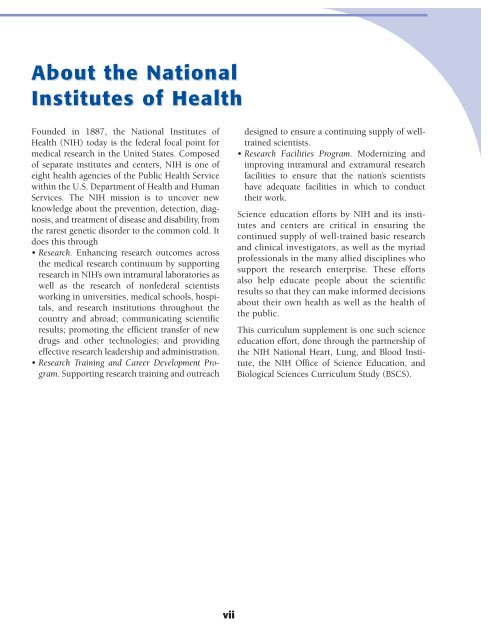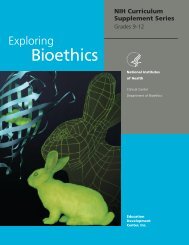Biological - NIH Office of Science Education - National Institutes of ...
Biological - NIH Office of Science Education - National Institutes of ...
Biological - NIH Office of Science Education - National Institutes of ...
You also want an ePaper? Increase the reach of your titles
YUMPU automatically turns print PDFs into web optimized ePapers that Google loves.
About the <strong>National</strong><br />
<strong>Institutes</strong> <strong>of</strong> Health<br />
Founded in 1887, the <strong>National</strong> <strong>Institutes</strong> <strong>of</strong><br />
Health (<strong>NIH</strong>) today is the federal focal point for<br />
medical research in the United States. Composed<br />
<strong>of</strong> separate institutes and centers, <strong>NIH</strong> is one <strong>of</strong><br />
eight health agencies <strong>of</strong> the Public Health Service<br />
within the U.S. Department <strong>of</strong> Health and Human<br />
Services. The <strong>NIH</strong> mission is to uncover new<br />
knowledge about the prevention, detection, diagnosis,<br />
and treatment <strong>of</strong> disease and disability, from<br />
the rarest genetic disorder to the common cold. It<br />
does this through<br />
• Research. Enhancing research outcomes across<br />
the medical research continuum by supporting<br />
research in <strong>NIH</strong>’s own intramural laboratories as<br />
well as the research <strong>of</strong> nonfederal scientists<br />
working in universities, medical schools, hospitals,<br />
and research institutions throughout the<br />
country and abroad; communicating scientific<br />
results; promoting the efficient transfer <strong>of</strong> new<br />
drugs and other technologies; and providing<br />
effective research leadership and administration.<br />
• Research Training and Career Development Program.<br />
Supporting research training and outreach<br />
designed to ensure a continuing supply <strong>of</strong> welltrained<br />
scientists.<br />
• Research Facilities Program. Modernizing and<br />
improving intramural and extramural research<br />
facilities to ensure that the nation’s scientists<br />
have adequate facilities in which to conduct<br />
their work.<br />
<strong>Science</strong> education efforts by <strong>NIH</strong> and its institutes<br />
and centers are critical in ensuring the<br />
continued supply <strong>of</strong> well-trained basic research<br />
and clinical investigators, as well as the myriad<br />
pr<strong>of</strong>essionals in the many allied disciplines who<br />
support the research enterprise. These efforts<br />
also help educate people about the scientific<br />
results so that they can make informed decisions<br />
about their own health as well as the health <strong>of</strong><br />
the public.<br />
This curriculum supplement is one such science<br />
education effort, done through the partnership <strong>of</strong><br />
the <strong>NIH</strong> <strong>National</strong> Heart, Lung, and Blood Institute,<br />
the <strong>NIH</strong> <strong>Office</strong> <strong>of</strong> <strong>Science</strong> <strong>Education</strong>, and<br />
<strong>Biological</strong> <strong>Science</strong>s Curriculum Study (BSCS).<br />
vii

















